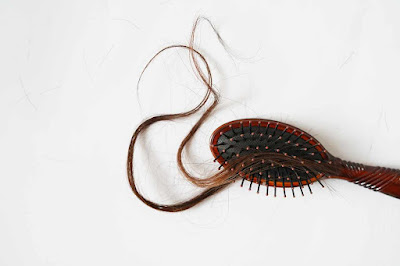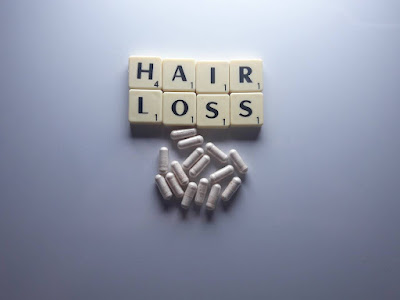Hair Loss in Men and Women
On any occasion in a typical Indian family setting, we often see a middle-aged man who has started to become bald or is already bald. When I researched about this issue, I was surprised to find just how many people have been searching for remedies to treat baldness.
A simple google search will give you hundreds of articles claiming some form of cure but people hardly focus on what’s actually causing them. So today, you will learn about what is hair loss, what are its causes, why does it occur and how do we treat it using proven scientific methods. Medically we call hair loss as alopecia.
How does hair grow?
The growth of hair largely depends on the age of the person, the nutrition they receive through their food, and finally how healthy the person is. Yes, these are the main factors which stand in between the healthy, flowing wind-like silky hair which everyone wants.
We all know our
skin sheds dead skin cells every day and in the same way, we lose at least
50-100 hairs each day which is normal. But here’s the catch the rate of hair
growth is 100 times greater when compared to the rate you lose your hair.
So, your hair growth starts in a layer of skin that
has special structures called hair follicles which have something called hair
roots. This region has an extensive blood supply which gives the essential
nutrients to support hair growth. Your skin also has certain glands called sebaceous glands which get the hair silky and smooth to touch.
What does your hair need to grow?
As with every part of our human body, our genetics
play a certainly important role, considering some people don’t find difficulty
in growing long hair. Some ethnicities have short hair, some have curly hair.
It all shows that genetics as a factor does play an important role. But the
major thing that’s important for the growth of the human body is nutrition, this is the
arena where things change drastically for many people across the world.
Your hair needs nutrients like Proteins; Vitamins C,
D, E; Biotin; Minerals like Iron, Zinc, Potassium, and Phosphorus. These
nutrients provide a major chunk of nutrients to the hair.
Why does hair fall occur?
1) Genetics: - Though it has a major role in certain cases, your genetics only contributes to about 30% of hair growth but this contribution is significant. For example, in certain genetic conditions like Male pattern baldness, female pattern baldness (Androgenetic alopecia). However, it's more often seen in men and has a different kind of presentation.
2)
General causes: -
· Scalp infection-
Conditions like dandruff, fungal infections can cause loss of hair due to infections of hair follicles. This can be due to lice infestations or ringworm disease. This can be easily identified by intense itching, white flakes falling from your head while scratching, pain and in severe conditions, it can bleed. They are often painful and people have the stigma attached to it. It's also easily treatable if done right.
· Poor nutrition and eating disorders- As we all know nutrition is vital for the proper growth and functioning of any part of our body any underlying conditions causing this deficiency like malnutrition, severe protein deficiency, anemia, intestinal infections, etc can cause fall in hair. Deficiency in protein causes a reduction in length and strength of hair, meanwhile deficiency in vitamins C, D, E can cause discoloration of the skin. The deficiency of Zinc and Iron makes your hair vulnerable to improper maturation and resulting in loss of hair follicles and end up making you go bald earlier in life.
·
Diets and freak fitness habits: - Any
sudden change in diet can cause your hair to lose its supply of vital
nutrients. That’s why its important to chose what diet you are taking up and
what’s your intended result after the diet, for example, you are diabetic and
you want to reduce your blood sugar levels, then your best diet would be a low
carb diet and not a keto diet because keto makes you lose a lot of vital
nutrients, whereas if you have a low carb diet then you will control your sugar
levels and as a bonus get to keep your hair healthy!
· Shampoos and hairstyles: - You should not be surprised when I say this because it’s a known fact, after shampooing your hair becomes dry and it also becomes difficult to comb your hair as it gets clumpy and also in that process you lose a lot of hair. Hairstyles although more common to women it does affect the male population too, the amount of toxic chemicals that are used to bleach or dye your hair is toxic to your hair follicles.
·
Stress: - With
mankind’s technological advancement and the emergence of a toxic work environment,
stress plays a major role in today's world and remains to be the most frequent
cause of hair loss majorly seen in middle-aged women and men in India.
De-stressing activities like exercise, yoga can help your body to relax and
release endorphins which promote healing and help a person achieve mental
stability in his/her life.
· Medical conditions and drugs that can cause loss of hair: - People undergoing chemotherapy and/or radiotherapy will lose their hair temporarily but regain it back after the cancer treatment is stopped or undergoing remission (called as Anagen Effluvium). This is because one of the side effects of chemotherapy is loss of hair as these drugs apart from killing the cancer cells can also affect normal cells. Another condition is Trichotillomania is a psychiatric condition where there the patient has this intense impulsiveness to pull out hair and ingest it, signs are characteristic bleeding patches on the scalp. These people must be given appropriate medical treatment to the patient.
· Hormonal
conditions: - Any change in function of adrenal glands
(Hypoandrogenemia), thyroid (Hyperthyroidism or Hypothyroidism), Gonads (PCOSin females and abnormal testis in males). All of them ultimately make you lose
hair and are often associated with any genetic conditions like Male or female
pattern baldness. The symptoms are noticeable like receding hairline, loss of
hair patch at the back of your head (very common in males), loss of hair patch
at the top of the scalp (very common in females).
· Miscellaneous: - Hair pulling, Trauma to the head, lack of exercise, Autoimmune conditions like Alopecia Areata.
Types of hair loss
1.
Alopecia Areata: - Hair
loss occurs in circular patches seen over the scalp. It is an autoimmune
condition and often associated with stress.
2.
Alopecia Totalis: - Exact
cause is not is known, here the scalp loses its hair completely, and often it is
permanent.
3.
Alopecia Universalis: - Here
the person loses their hair from all hair growing regions of the body, namely
beard, eyebrows, eyelashes, pubic region, underarms, etc.
4.
Traction Alopecia: -
It is caused due to intense braiding of hair while doing hairstyles, simple
prevention of aggressive grooming will help your hair to heal properly.
What do to do if you have genetic factors causing
baldness?
1)
If baldness is prevalent in your
family (especially for males and women who have PCOS), you can get tested early
for a gene which may be present as a contributing factor. This is because in the majority of cases even though the gene is present, the external factors which
we talked about earlier are the main culprits for causing baldness and the genes
are just contributing to it making you go bald faster.
2)
Signs to watch out for susceptibility
to baldness: - Receding hairline (“M” shaped hair loss in males), Falling of
hair while braiding or combing your hair, dry scalp, Shiny or oily scalp.
3) Treatment: -
NOTE: -
These methods are only mentioned to provide you information about various treatment options that are available to you. All treatments suggested here should be taken with the proper advice and detailed prescription from your dermatologist or other medical practitioners.
Male and Female pattern baldness: -
a. Minoxidil is a drug which is given if baldness is detected, its effect is however seen only after a period of 6 months of usage if you’ve followed the course suggested by your dermatologist. It is available as shampoos, tablets, and long sustained derma patches.
Side effects: - Hypertrichosis viz. growth of unwanted hair at
wrong places or all over the body. Low blood pressure, Allergic reactions,
Change in hair color, texture, and thinness.
b.
Finasteride and Spironolactone: - These
are anti-androgen drugs that prevent the conversion of Testosterone to
Dihydrotestosterone and prevent hair loss. It has proved to be beneficial to
treat hair loss due to PCOS as it has a similar mechanism of action, however, it’s
not effective for males over the age of 60. It’s also important for women that they
can’t get bald when compared to their male counterparts as the progress is more
rapid in severe in males than in females.
c.
Iron supplementation: -
Effective, especially for women who have been diagnosed with anemia and other
blood conditions, can directly help increase blood flow and restore hair
follicles.
d.
Hair Transplantation: - Various techniques are to be discussed with your doctor. Major
ones include grafting, laser technique, etc.
General prevention procedures or techniques
1) Exercise: - Healthy workout routines will improve blood flow to the scalp and promote better health of the hair follicles.
2)
Choosing a diet which is best for you
is an important and great step to ensure there’s no loss of vital nutrients.
3)
Treatment of underlying conditions
like dandruff, fungal infections. Additionally, people should maintain
cleanliness and ensure anti-dandruff measures as advised by your doctors to
prevent spread to your family members.
4) Anti-stress measures
like Yoga, Meditation, Listening to music, hobbies are some of the fun and
effective ways to ensure good overall health and not just your hair!
5)
Avoid excessive
use of oral contraceptives, hormonal pills, and certain antibiotics and steroids
as they can cause hair loss.
6)
If you have any systemic diseases
like Diabetes, Hypertension, Thyroid disorders, PCOS, etc take appropriate
treatment to improve your hair health.
7)
Application of herbal ayurvedic
oils and certain proved home remedies and involving curry leaves in
your diet can help you achieve good hair health.
8)
Avoid using strong shampoos
and instead use milder versions and give a gap of at least 2 weeks to prevent
the loss of sebum oils (it's one of the factors for lice infections and
subsequent hair loss due to dandruff)
9) Warm oil scalp massage, reduce dying of hair, taking diet rich in omega-3 fatty acids.
10) Foods
that can be eaten to maintain good hair and scalp health: - Eggs, Berries,
Spinach, Fatty Fish (Salmon), Sweet Potatoes, Avocados, Nuts (Almonds),
Soybeans, Meat, etc
Summary
This article discussed what is hair loss, why does it
occur, what are the causes and how can we treat and prevent hair loss to occur.
Please note that these procedures show results for a lengthy time period. Hence
it's essential to follow whatever treatment plan you have diligently to get
effective results. If you are happy, the body will be happy and you will be with smooth and shiny hair!
Thank you for reading this article until the end and
hopefully learning something new about your hair. If you liked it then please
share this article with your family and friends.




